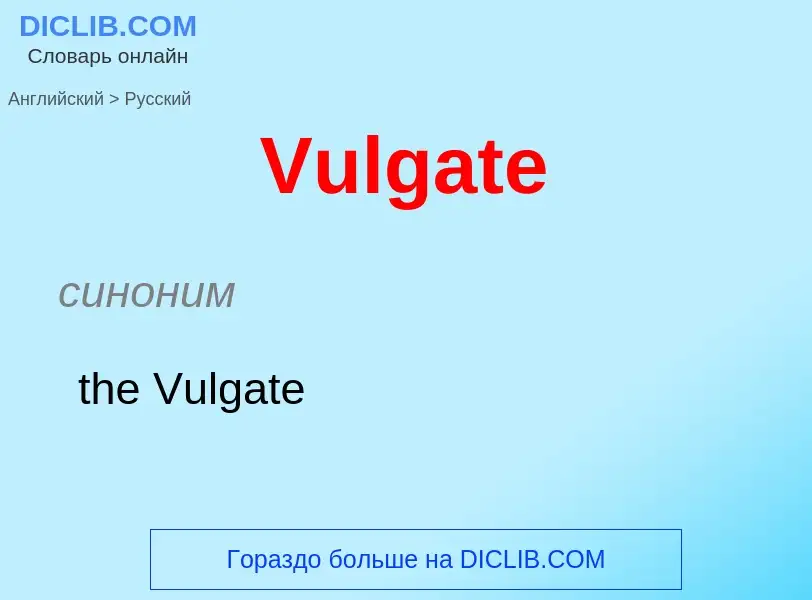Traduzione e analisi delle parole tramite l'intelligenza artificiale ChatGPT
In questa pagina puoi ottenere un'analisi dettagliata di una parola o frase, prodotta utilizzando la migliore tecnologia di intelligenza artificiale fino ad oggi:
- come viene usata la parola
- frequenza di utilizzo
- è usato più spesso nel discorso orale o scritto
- opzioni di traduzione delle parole
- esempi di utilizzo (varie frasi con traduzione)
- etimologia
vulgate - traduzione in Inglese
синоним
['vʌlg(e)it]
прилагательное
общая лексика
(Vulgate) относящийся к вульгате
встречающийся в вульгате
общепринятый
общеизвестный
существительное
['vʌlg(e)it]
общая лексика
(the Vulgate) вульгата
латинская библия
общепринятый вариант (текста)
общеизвестный текст
разговорный язык
Definizione
Wikipedia
.jpg?width=120)
The Vulgate (; also called Biblia Vulgata (Bible in common tongue), Latin: [ˈbɪbli.a wʊlˈɡaːta]), sometimes referred to as the Latin Vulgate, is a late-4th-century Latin translation of the Bible.
The Vulgate is largely the work of Jerome who, in 382, had been commissioned by Pope Damasus I to revise the Vetus Latina Gospels used by the Roman Church. Later, on his own initiative, Jerome extended this work of revision and translation to include most of the books of the Bible. The Vulgate became progressively adopted as the Bible text within the Western Church. Over succeeding centuries, it eventually eclipsed the Vetus Latina. By the 13th century it had taken over from the former version the designation versio vulgata (the "version commonly used") or vulgata for short. The Vulgate also contains some Vetus Latina translations that Jerome did not work on.
The Vulgate was to become the Catholic Church's officially promulgated Latin version of the Bible as the Sixtine Vulgate (1590), then as the Clementine Vulgate (1592), and then as the Nova Vulgata (1979). The Vulgate is still currently used in the Latin Church. The Catholic Church affirmed the Vulgate as its official Latin Bible at the Council of Trent (1545–1563), though there was no authoritative edition at that time. The Clementine edition of the Vulgate became the standard Bible text of the Roman Rite of the Catholic Church, and remained so until 1979 when the Nova Vulgata was promulgated.

.jpg?width=200)
![A page from the ''[[Codex Amiatinus]]'' containing the beginning of the [[Gospel of Mark]]. A page from the ''[[Codex Amiatinus]]'' containing the beginning of the [[Gospel of Mark]].](https://commons.wikimedia.org/wiki/Special:FilePath/Codex Amiatinus - Gospel of Mark, chapter 1.jpg?width=200)

![''Saint Jerome in His Study'', by [[Domenico Ghirlandaio]]. ''Saint Jerome in His Study'', by [[Domenico Ghirlandaio]].](https://commons.wikimedia.org/wiki/Special:FilePath/Domenico Ghirlandaio - St Jerome in his study.jpg?width=200)

.jpg?width=200)
